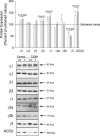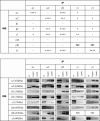5'AMP activated protein kinase expression in human skeletal muscle: effects of strength training and type 2 diabetes
- PMID: 15718261
- PMCID: PMC1464439
- DOI: 10.1113/jphysiol.2005.082669
5'AMP activated protein kinase expression in human skeletal muscle: effects of strength training and type 2 diabetes
Abstract
Strength training enhances insulin sensitivity and represents an alternative to endurance training for patients with type 2 diabetes (T2DM). The 5'AMP-activated protein kinase (AMPK) may mediate adaptations in skeletal muscle in response to exercise training; however, little is known about adaptations within the AMPK system itself. We investigated the effect of strength training and T2DM on the isoform expression and the heterotrimeric composition of the AMPK in human skeletal muscle. Ten patients with T2DM and seven healthy subjects strength trained (T) one leg for 6 weeks, while the other leg remained untrained (UT). Muscle biopsies were obtained before and after the training period. Basal AMPK activity and protein/mRNA expression of both catalytic (alpha1 and alpha2) and regulatory (beta1, beta2, gamma1, gamma2a, gamma2b and gamma3) AMPK isoforms were independent of T2DM, whereas the protein content of alpha1 (+16%), beta2 (+14%) and gamma1 (+29%) was higher and the gamma3 content was lower (-48%) in trained compared with untrained muscle (all P < 0.01). The majority of alpha protein co-immunoprecipitated with beta2 and alpha2/beta2 accounted for the majority of these complexes. gamma3 was only associated with alpha2 and beta2 subunits, and accounted for approximately 20% of all alpha2/beta2 complexes. The remaining alpha2/beta2 and the alpha1/beta2 complexes were associated with gamma1. The trimer composition was unaffected by T2DM, whereas training induced a shift from gamma3- to gamma1-containing trimers. The data question muscular AMPK as a primary cause of T2DM whereas the maintained function in patients with T2DM makes muscular AMPK an obvious therapeutic target. In human skeletal muscle only three of 12 possible AMPK trimer combinations exist, and the expression of the subunit isoforms is susceptible to moderate strength training, which may influence metabolism and improve energy homeostasis in trained muscle.
Figures




References
-
- Barnes BR, Marklund S, Steiler TL, Walter M, Hjalm G, Amarger V, et al. The AMPK-gamma 3 isoform has a key role for carbohydrate and lipid metabolism in glycolytic skeletal muscle. J Biol Chem. 2004;279:38441–38447. - PubMed
-
- Bergeron R, Ren JM, Cadman KS, Moore IK, Perret P, Pypaert M, Young LH, Semenkovich CF, Shulman GI. Chronic activation of AMP kinase results in NRF-1 activation and mitochondrial biogenesis. Am J Physiol Endocrinol Metab. 2001;281:E1340–E1346. - PubMed
-
- Buhl ES, Jessen N, Schmitz O, Pedersen SB, Pedersen O, Holman GD, Lund S. Chronic treatment with 5-aminoimidazole-4-carboxamide-1-beta-d-ribofuranoside increases insulin-stimulated glucose uptake and Glut4 translocation in rat skeletal muscles in a fiber type specific manner. Diabetes. 2001;49:12–17. - PubMed
-
- Chen Z, Heierhorst J, Mann RJ, Mitchelhill KI, Michell BJ, Witters LA, Lynch GS, Kemp BE, Stapleton D. Expression of the AMP-activated protein kinase beta1 and beta2 subunits in skeletal muscle. FEBS Lett. 1999;460:343–348. - PubMed
Publication types
MeSH terms
Substances
LinkOut - more resources
Full Text Sources
Other Literature Sources
Medical

